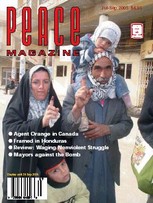
Peace Magazine Jul-Sep 2005, page 5. Some rights reserved.
Search for other articles by various here
Ken Simons gives a good historical overview of Lebanon's political structures in "Lebanon's Democratic Culture Shows its Roots." He points out how the democratic ethos has to work with cooperation and compromises within a society deeply divided along clanic and religious lines in a Middle East not often given to cooperation and compromise.
From outside, we must do all we can to help consolidate the nonviolent changes in Lebanon and to expand their impact to other states in the area. A first step is to build awareness of the active nonviolent nature of these changes.
Some commentators have stressed that the US-led change of regime in Iraq was the driving force for change in Lebanon and the redeployment of Syrian troops. Such analysis seriously underestimates the will and actions of the Lebanese people and the key role of nonviolent activists.
During the Civil War period in Lebanon (1975-1989), there had been training programs in nonviolent action. People were trained to analyze a conflict situation, see the strengths and weaknesses of the contending groups, and be ready to move when conditions were ripe.
Along with the changes in Georgia, Ukraine, and Kyrgyzstan, we see a tide of nonviolent changes in government. There is always a difference between a mob of people who gather for protest and disciplined non-violent actors. In each of these situations, we have organized nonviolence at work, people learning from each other's experience. We need to encourage this tide.
René Wadlow
Gravières, France
Norman Epstein's argument (letters, April-June 05) that Israel's so-called "security fence" is a needed protection against suicide bombers appears logical -- only if one attributes to Palestinians an irrational hatred of Jews coupled with a depraved proclivity for violence. But it is this premise that is a revolting lie in need of scrutiny. It completely ignores that suicide bombing in Israel is a relatively new phenomenon that only began in 1994, after decades of a brutal and grinding occupation. During the first uprising that began in 1987 -- years before the first Palestinian ever thought of using his body as a lethal weapon -- nearly a thousand unarmed teenagers were shot to death by Israeli forces, while popular activists such as Mubarek Awad, who preached nonviolent resistance, were deported.
In a case that shocked many observers, four Israeli border guards found guilty of killing an unarmed Palestinian were fined one agora each (less than a penny) in an unmistakable message by Israel's judiciary on the value of an Arab's life. It was perhaps not surprising that when Jewish settler Baruch Goldstein slaughtered 29 Muslim worshippers at a mosque in Hebron, Israeli authorities slapped a curfew -- not on the 500 settlers who strut about with Uzis -- but on the town's entire Palestinian population while a settler rabbi proclaimed that the "life of a million Arabs isn't worth the fingernail of a Jew."
All this happened before the first suicide bomb ever exploded. The obscene racism continues to this day. Native-born Palestinian farmers in the West Bank cannot feed their families because Israeli authorities forbid them to dig new wells to irrigate their fields, while almost within sight Jewish settlers from Brooklyn and Toronto splash about in swimming pools, as no such restrictions apply to them. The ultimate degradation occurs when Palestinians -- their economies strangled by Israel -- are reduced to working as laborers building Jewish-only settlements on their own expropriated lands in order to feed their families.
No people on earth can forever endure such grotesque humiliations, such contemptuous trampling on their dignity. Instead of vilification, Palestinians deserve empathy for their predicament and praise for their restraint. Some have exhibited humanity that is inspiring: The Hebrew newspaper Haaretz reported last year that a Palestinian family donated the organs of their deceased son to help save the lives of three Israelis. It is such inherent decentness that needs to be recognized and cultivated. This, not apartheid walls, will provide Israelis and Palestinians with the security they both deserve.
John Dirlik
Pointe-Claire, QC

Peace Magazine Jul-Sep 2005, page 5. Some rights reserved.
Search for other articles by various here